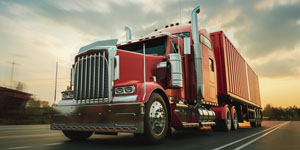More information about bulk cargo hauling
Bulk Cargo is bulk material, usually a specific commodity, hauled using various types of trailers and is delivered to a customer for use in a specific industry. Bulk cargo includes grain, soybeans, corn, and other agriculture products; various liquids; coal, propane, gasoline, and other fuels; wood products like pulp wood and mulch; construction products such as sand and gravel; and recyclable materials.
Trailers used for hauling bulk cargo vary and are often designed for specific type of materials:
• Hoppers: a trailer acting as a dump truck with the ability to tip and “end dump” the bulk material.
• Walking Floor: a trailer that may or may not tip but includes equipment to push the cargo from the rear. Also allow for “dump spreading.”
• Pneumatic: a large-body enclosed tank trailer, vacuum-sealed that empties using a pump and forced air. Often used to haul cement, sand, ash, and lime; flour, sugar, and grains; and plastic pellets, industrial alcohol, and dry and liquid chemicals.
• Belt Trailers: a self-unloading trailer using a continuous belt pulled by a chain for unloading bulk materials.
Bulk Cargo drivers are typically hired by processors and distributors of bulk cargo, or if the need is large enough, by companies that use the materials. The producers of the material to be hauled may employ its own drivers, or they may contract drivers to haul and deliver the material.
Typically, bulk material haulers travel shorter distances than haulers of dry or refrigerated cargo. Bulk materials are often used within short distances of the supplier, and the materials needed are often common throughout the U.S. Agricultural products, if not available in an area of the country, are frequently perishable, and the window of time from field to the consumer market is limited.
As with all truck drivers, those hauling bulk materials must hold the appropriate CDL for the type of vehicle being driven (Class A, B, and/or C). Likewise, as the materials and trailer types a driver hauls will likely vary, so driver should be thoroughly familiar with the type of trailer the materials is hauled in and how to operate offloading features. It is advisable that those expecting to haul bulk materials obtain endorsements including (H) Hazardous Materials and (N) Tanker. In some states, drivers may be able to receive the (X) endorsement, a combination endorsement allowing them to haul Hazardous Materials in a Tanker-type trailer.
Many drivers hauling bulk materials are owner operators, owners of small fleets, and/or drivers experienced in the type of material contracted for hauling. The company owning the material, if not having trucks with trailers designed for the type of material being hauled, may contract with a carrier, a single owner operator, or several owner operators.
Depending on who or what carrier the supplier decides to hire to transport bulk materials, drivers can expect to be paid in varying methods. If a driver is an employee of a carrier, the bulk material will likely be considered as any other cargo. In this case, the driver will be paid per agreement with the employer. If a driver is an owner operator of a single truck or owns a small fleet, a supplier may contract to pay a lump sum upon delivery, or if a large amount of materials is to be delivered, periodic payments may be provided.
Job search faqs
jobs.thetrucker.com is one of the leading sources for truck driving and diesel mechanic job listings, and its primary objective is to connect professional drivers and mechanics with jobs. jobs.thetrucker.com’s job search functionality is designed to be simple and easy to use, and allows you to search for jobs by state, by carrier and various other search criteria.
Once you apply for a job, we match your qualifications to the appropriate job listings and send your application to the hiring companies immediately.
jobs.thetrucker.com’s job search functionality is designed to be simple and easy to use, and allows truck drivers and diesel mechanics to search for jobs by state, by carrier and various other search criteria. When searching for jobs, you may set the search criteria to be as specific or general as you want to find the job that is best for you.
jobs.thetrucker.com adds and updates job listings immediately as new truck driving and diesel mechanic job listings are received. So it is best to visit jobs.thetrucker.com regularly for updated job listings when in the market for a new truck driving or diesel mechanic job.
No! Drivers and mechanics may access job listings, job resources and submit job applications on jobs.thetrucker.com free of charge using their phone, desktop or any other device.
Yes! We encourage you to apply for all jobs that you have an interest and that match your qualifications. Applying for multiple jobs increases your chances of finding the best job for you.
After you have submitted your application on jobs.thetrucker.com, you will receive an email confirmation that your application has been received.
If you do not receive this confirmation email, please check your spam or junk folder. If you determined you did not receive the email confirmation, please Contact Us.
jobs.thetrucker.com processes job applications immediately and automatically sends driver and mechanic applications to the hiring company once we confirm your qualifications meet the job requirements.
Companies' response time may vary based on the urgency of their hiring needs, the number applications the comppany receives and the resources dedicated to processing applications. Applicants increase their chances of being contacted by applying to all jobs that meet their qualifications.
Carrier may or may not respond to all applications depending on their hiring policies, procedures and driver needs. And, it is possible that a carrier will not respond to applicants if their experience does not match the hiring requirements. Applicants will increase their chances of being contacted by carriers by applying to all jobs that meet their qualifications.
Along with all truck driving and diesel mechanic job listings, jobs.thetrucker.com provides information about all carriers offering jobs in the carrier’s information page. Each carrier’s information page is accessible from the each individual job listing, and from the "Carriers List" in the "Resource" drop down.
A commercial driver license (CDL) is a license required to operate large, heavy, or hazardous material vehicles in the US. The class of CDL a truck driver depends on the type of commercial motor vehicle operated. A truck driver may hold a CDL in one of three classes: Class A, Class B, and Class C.
Driver Type refers to the employment arrangement a driver operates. The most common truck driver arrangements include:
- Company Driver: Drivers employed by a specific carrier with its own fleet of trucks. Companies can be carriers that contract to transport freight, or companies that carry their own freight.
- Lease-Purchase: Drivers hired by carriers where the truck is leased to the individual driver.
- Owner Operator (OO): Drivers who own the truck and operate as an independent business (also referred to as an "independent contractor").
- Team Driver: Drivers operating with a partner who shares driving duties.
Hauling Type (or trailer type, or equipment type) refers to the type of cargo being hauled. Different types of cargo materials require different types of trailers, and each type of trailer requires unique driver experience.
Endorsements are required certifications for CDL holders hauling various types of equipment and freight. The most common endorsements for long haul truck drivers include:
- Doubles/Triples: required for drivers hauling double or triple trailers.
- HazMat: required for transporting hazardous materials.
- Tanker: required for operating a vehicles designed with a permanent or temporary tank attached.
The information you provide when submitting a job application is secured by an encrypted SSL security certificate because the privacy of your personal information is important to us. See our Privacy Policy and Terms of Service.
Finding the right diesel mechanic job requires careful consideration of various factors. Research potential employers’ reputation and culture, evaluate compensation packages, and confirm that long-term growth and advancement opportunities fit with your career goals. Other factors to consider include: your own level of experience, skill and industry specialization vs the job requirements; CDL license requirements; tool requirements; location; training and professional development opportunity; work schedule, flexibility and work-life balance. For key considerations for finding a job as a heavy-duty truck diesel mechanic or technician, visit our Diesel Mechanic Job Resources.
Diesel mechanic certifications represent an industry recognized level of knowledge and expertise in a particular area of diesel engine diagnosis, repair or maintenance. These advanced certifications are offered by the National Institute for Automotive Service Excellence (ASE) and enhance a mechanic’s skill set and positively impact their qualifications and salary. Certifications may be obtained in specific areas such as gasoline and diesel engines, drive trains, brakes, suspension and steering, electronics, HVAC and preventative maintenance. For a listing of ASE certifications available specifically for heavy-duty truck mechanics, visit our Diesel Mechanic Job Resources.



